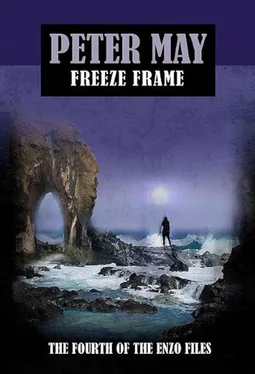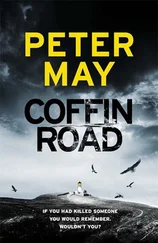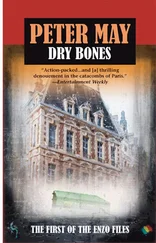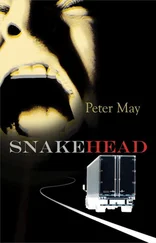Peter May - Freeze Frames
Здесь есть возможность читать онлайн «Peter May - Freeze Frames» весь текст электронной книги совершенно бесплатно (целиком полную версию без сокращений). В некоторых случаях можно слушать аудио, скачать через торрент в формате fb2 и присутствует краткое содержание. Жанр: Классический детектив, на английском языке. Описание произведения, (предисловие) а так же отзывы посетителей доступны на портале библиотеки ЛибКат.
- Название:Freeze Frames
- Автор:
- Жанр:
- Год:неизвестен
- ISBN:нет данных
- Рейтинг книги:5 / 5. Голосов: 1
-
Избранное:Добавить в избранное
- Отзывы:
-
Ваша оценка:
- 100
- 1
- 2
- 3
- 4
- 5
Freeze Frames: краткое содержание, описание и аннотация
Предлагаем к чтению аннотацию, описание, краткое содержание или предисловие (зависит от того, что написал сам автор книги «Freeze Frames»). Если вы не нашли необходимую информацию о книге — напишите в комментариях, мы постараемся отыскать её.
Freeze Frames — читать онлайн бесплатно полную книгу (весь текст) целиком
Ниже представлен текст книги, разбитый по страницам. Система сохранения места последней прочитанной страницы, позволяет с удобством читать онлайн бесплатно книгу «Freeze Frames», без необходимости каждый раз заново искать на чём Вы остановились. Поставьте закладку, и сможете в любой момент перейти на страницу, на которой закончили чтение.
Интервал:
Закладка:
“No.” Enzo looked down at his salad to charge his fork with more fish, hiding an emotional moment. He knew only too well how irreplaceable the people in your life really were. Then he glanced over and watched the old incomer’s cumbersome cutting action as he attempted to dissect his tuna. “You hold your cutlery in the most peculiar way, Monsieur Gassman, if you don’t mind my saying so.”
Gassman looked up, amused. “I do. And I don’t mind. You can blame my mother for it. I’m a left-hander, monsieur, and for some reason, when I was a boy, there was some stigma attached to that. As if it were an aberration of some kind. So my mother made me hold my cutlery like a right-handed person would.”
Enzo smiled. “Corrie-fisted we would have called it in Scotland.”
“It never felt right to me. But by the time I was grown up, it didn’t feel good the other way either.” He laughed. “So all my life, I’ve eaten like I have a handicap.” He breathed in and puffed himself up. “But as you can see, it never stopped me getting the food to my mouth.”
The deep, piercing sound of a ship’s horn rang out across the bay, and they looked up to see the ferry easing its way into the harbour, its wash setting all the small boats at berth rising and falling in turn.
Enzo finished his salad and drained his glass before leaving a couple of notes on the table and getting to his feet. “I’m afraid I have to go and get my jeep into the queue,” he said. “I’ve enjoyed talking to you, Monsieur Gassman.” They shook hands.
“Well, don’t be a stranger, young man. Come out and see me any time. I have only my dog for company these days, and it can get a little lonely sometimes.”
“I’ll do that,” Enzo said, and he set off along the cobbled jetty to retrieve his vehicle from its parking place and get in line. It took him nearly ten minutes, and by the time he was sitting idling on the quayside, and glanced back along the jetty, the old man was gone. It wasn’t until he had driven his jeep onboard and made his way up to the passenger deck, that he saw, in the distance, Jacques Gassman making his way slowly up the hill, past Coconut’s and the bicycle shop. A difficult, shuffling gait. There was something oddly sad about the old man. He had lost his wife more than half a lifetime ago, and all these years later was still alone and lonely. With nothing to look forward to but the certainty of death, just a heartbeat away.
Chapter Fifteen
The Rue du Port ran along the side of the hill, parallel with the Quai des Indes, which was a deep-water channel cut into the heart of the city of Lorient from the inner harbour. There the yachts lined up side by side, touching and nudging, almost sensually, in time with the distant pulse of the sea. The street on the hill had been pedestrianised and cobbled, and young albizia trees planted all along its centre. In time they would provide dappled shade for the whole street with their frondy foliage and pink-and-white flowers. Now they were shedding, and the fine red and yellow leaves swirled and gathered in tiny drifts in the breeze that had sprung up.
Enzo found the offices of Ouest-France at number 55, and settled himself at a desk to sift through the newspaper’s coverage of the trial from 1991. It was the major story of the day, achieving regular two-page spreads, with detailed reporting of evidence presented and testimony given. Enzo navigated his way through them by using subheadings as information markers, guiding him to the particular passages he was anxious to read.
Beneath the headline, A DEADLY ENCOUNTER, he found the evidence given by Kerjean’s lover, Arzhela Montin. The court reporter had wielded a colourful pen.
The pale and fragrant Madame Montin sat with hands clasped, a tremor in her voice as she told the court of her fear of the accused. Describing him as “brutal” and “threatening,” she nonetheless claimed that Kerjean had been a fierce and passionate lover.
“We would make love whenever and wherever we could,” she told the procureur.
Asked if she had been aware of his reputation for violence when she took up with him, she replied: “I had heard that he was a man with a temper and prone to violence. In the early days of our relationship I saw no sign of it. But as time went on, our sexual encounters became more violent, more… frenzied. And he became increasingly possessive. If I couldn’t see him, he demanded to know why. He insisted that I not make love to my husband, and said that he would kill any man that came between us.”
“Would you say that you were afraid of him?” the procureur asked.
“Yes, monsieur. In the end, I was very afraid. He was becoming totally unreasonable and quite unpredictable.”
“Then why didn’t you just leave him?”
“Two reasons,” she told the court. “I was addicted to him. He made love to me like no man had ever made love to me before.” And when the procureur demanded to know what the second reason was, she replied: “I was very much afraid of what he might do.”
“To you?”
“To my husband. And perhaps to me, too.”
The accused sat cold and impassive in the dock as she went on to describe to the court the events of September 9, 1990, at the abandoned Fort du Grognon on the Ile de Groix. There, she and Kerjean had been engaged in a passionate bout of lovemaking when they were unexpectedly interrupted by the deceased, Adam Killian.
“Thibaud went crazy,” she said, tears brimming in her eyes from the memory. “He was just an old man, kind of skinny and pale. But Thibaud screamed and shouted at him. Accused him of spying on us, of being a dirty voyeur. He literally chased him from the fort. It would have been comical if it wasn’t so grave. I was terrified that word would get out about our affair. Thibaud was stark naked, pushing the old man across the old parade ground, slashing at his legs with a stick. When they disappeared into the tunnel I couldn’t see them any longer, but I could still hear Thibaud shouting.”
“Did you hear him make any direct threats toward the deceased, Madame Montin?” the avocat de la partie civile asked her.
Madame Montin seemed to hesitate, and only answered after a prompting from the bench. She told the procureur: “I heard him shout- you breathe a word of this, you old bastard, and I’ll have your
This was the lurid reporting of a tabloid journalist, and Enzo was immediately wary of putting too much store by it. The quotes were selective, feeding an unsophisticated readership’s eager appetite for sex, violence and fear. But it was clear, all the same, how Arzhela Montin’s testimony must have fed popular antagonism toward Kerjean and inflicted considerable damage on his defence. How quickly love had turned into something so destructive.
Michel Locqueneux, a mechanic from the garage at Port Tudy where Kerjean had his car serviced and repaired, had been called to give evidence for the prosecution. He had told the court that Kerjean had brought his car in for its annual vidange the morning of the day that Killian was murdered. His testimony was that the car was running perfectly when it left the garage and that there was not a single reason he could think of for it breaking down that night, as Kerjean claimed. He had also told the court that Kerjean had not subsequently brought the car back for examination. And so the fault that appeared, then disappeared so mysteriously in the course of one night, remained unexplained.
Kerjean’s lawyer called several rebuttal witnesses to discredit Locqueneux, disgruntled clients who told stories of oil leaks and failing brakes and engine malfunction after servicing at the Locqueneux garage.
Several customers from Le Triskell were called to describe Kerjean’s rantings in the bar the night he threatened to put Killian in the cemetery.
Читать дальшеИнтервал:
Закладка:
Похожие книги на «Freeze Frames»
Представляем Вашему вниманию похожие книги на «Freeze Frames» списком для выбора. Мы отобрали схожую по названию и смыслу литературу в надежде предоставить читателям больше вариантов отыскать новые, интересные, ещё непрочитанные произведения.
Обсуждение, отзывы о книге «Freeze Frames» и просто собственные мнения читателей. Оставьте ваши комментарии, напишите, что Вы думаете о произведении, его смысле или главных героях. Укажите что конкретно понравилось, а что нет, и почему Вы так считаете.












